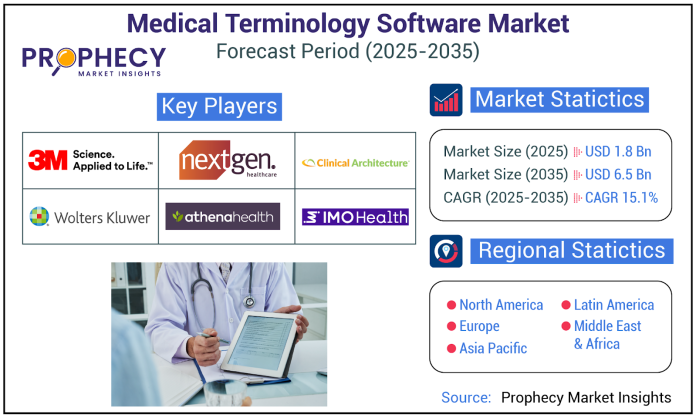Medical terminology software in healthcare helps professionals manage and use medical language. It includes equipment such as medical dictionary, reference library and learning modules. Medical vocabulary software adoption is increasing due to the requirement of accurate patient data, improving patient care, increasing electronic health records (EHRS), rapidly growing emerging economies due to exponential growth of medical tourism, integration of advance technologies and the need for regulatory compliance.
Increasing the Electronic Health Record (EHRS) the medical terminology software is growing, focusing on clinical documentation accuracy, and demand for standardized healthcare communication. Integration with AI and NLP technologies increases efficiency in coding, billing and data exchange, which works widely in hospitals and clinics.
Key Growth Drivers and Opportunities
Growing Demand for Better Patient Care: Demand better patient care through improved interoperability, accuracy, and communication is propelling the market for medical terminology software. The initiative promotes precise data interchange between healthcare professionals by unifying medical terminology, which optimizes diagnosis and treatment results. Implementation of such software is crucial for fostering more effective, well-coordinated, and superior patient care as healthcare systems develop.
Challenges
The Data security and privacy in healthcare is a serious concern globally. There are numerous types of software used in healthcare that are required by law to have data security, depending on where to operate and where patients are using the software. Compliance with rules such as hipaa, GDPR, and regional health services is required to protect the information of sensitive patients. Increase in cyber threats and increasing digitalization in healthcare has intensified the demand for strong, safe software solutions worldwide.
Innovation and Expansion
Vital Launches AI Tool to Simplify Medical Jargon for Patients
In August 2024, Vital Company, announced the launch of its AI-powered Doctor-to-Patient Translator, designed to transform highly technical medical terminology into plain language that any patient can understand.
Using the latest Large Language Models (LLMs) and Natural Language Processing (NLP), Vital’s HIPAA-compliant Doctor-to-Patient Translator creates 5th-grade reading-level explanations of lab and imaging results, doctor notes, discharge summaries and patient instructions, and other important medical information.
AWS Unveils HealthScribe to Streamline Clinical Documentation with AI
In July 2023, Amazon Web Services (AWS) announced the launch of HealthScribe, deepening its commitment to augmenting healthcare delivery and innovating cutting-edge industry solutions.
HealthScribe is a new service that will enable healthcare software developers and providers to create clinical applications that use speech recognition, artificial intelligence capabilities, and advanced machine learning algorithms to help generate clinical documentation and thereby, enrich provider workflows.
Inventive Sparks, Expanding Markets
The companies operating in the market are Apelon, Inc, 3M, NXGN Management, LLC, Wolters Kluwer N.V., Athenahealth, Inc., and others. Focus on precise and current medical coding standards, seamless integration with current healthcare systems, user-friendly interfaces, continuous education and support, strong data security, flexibility in response to regulatory changes, and strategic alliances with medical professionals.
About Author:
Prophecy is a specialized market research, analytics, marketing and business strategy, and solutions company that offer strategic and tactical support to clients for making well-informed business decisions and to identify and achieve high value opportunities in the target business area. Also, we help our client to address business challenges and provide best possible solutions to overcome them and transform their business.


